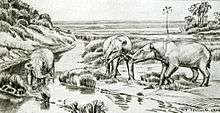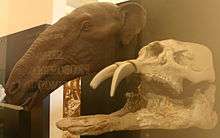Phiomia
| Phiomia Temporal range: Late Eocene - Early Oligocene, 36–30 Ma | |
|---|---|
| | |
| Scientific classification | |
| Kingdom: | Animalia |
| Phylum: | Chordata |
| Class: | Mammalia |
| Order: | Proboscidea |
| Family: | †Phiomiidae |
| Genus: | †Phiomia |
| Species: | †P. serridens |
| Binomial name | |
| Phiomia serridens Andrews & Beadnell, 1902 | |
Phiomia is an extinct genus of basal proboscid that lived in what is now Northern Africa during the Late Eocene to Early Oligocene some 36-30 million years ago. "Phiomia serridens" means "saw-toothed animal of Faiyum".
Description

Restoration

Phiomia minor skull and model
Phiomia was around 2.5 metres (8.2 ft) high, and vaguely resembled a modern elephant, although, based on the shape of its nasal bones, it had only a very short trunk. It had short tusks on the upper jaw and also short shovel-like tusks on the lower jaw that were most likely used for gathering food. These were similar to those of the Miocene Platybelodon, Archaeobelodon, and Amebelodon, but considerably smaller. The tusks in the upper jaw may have been used in defence,[1] or scraping bark off trees.
References
| Wikimedia Commons has media related to Phiomia. |
This article is issued from Wikipedia - version of the 11/12/2016. The text is available under the Creative Commons Attribution/Share Alike but additional terms may apply for the media files.